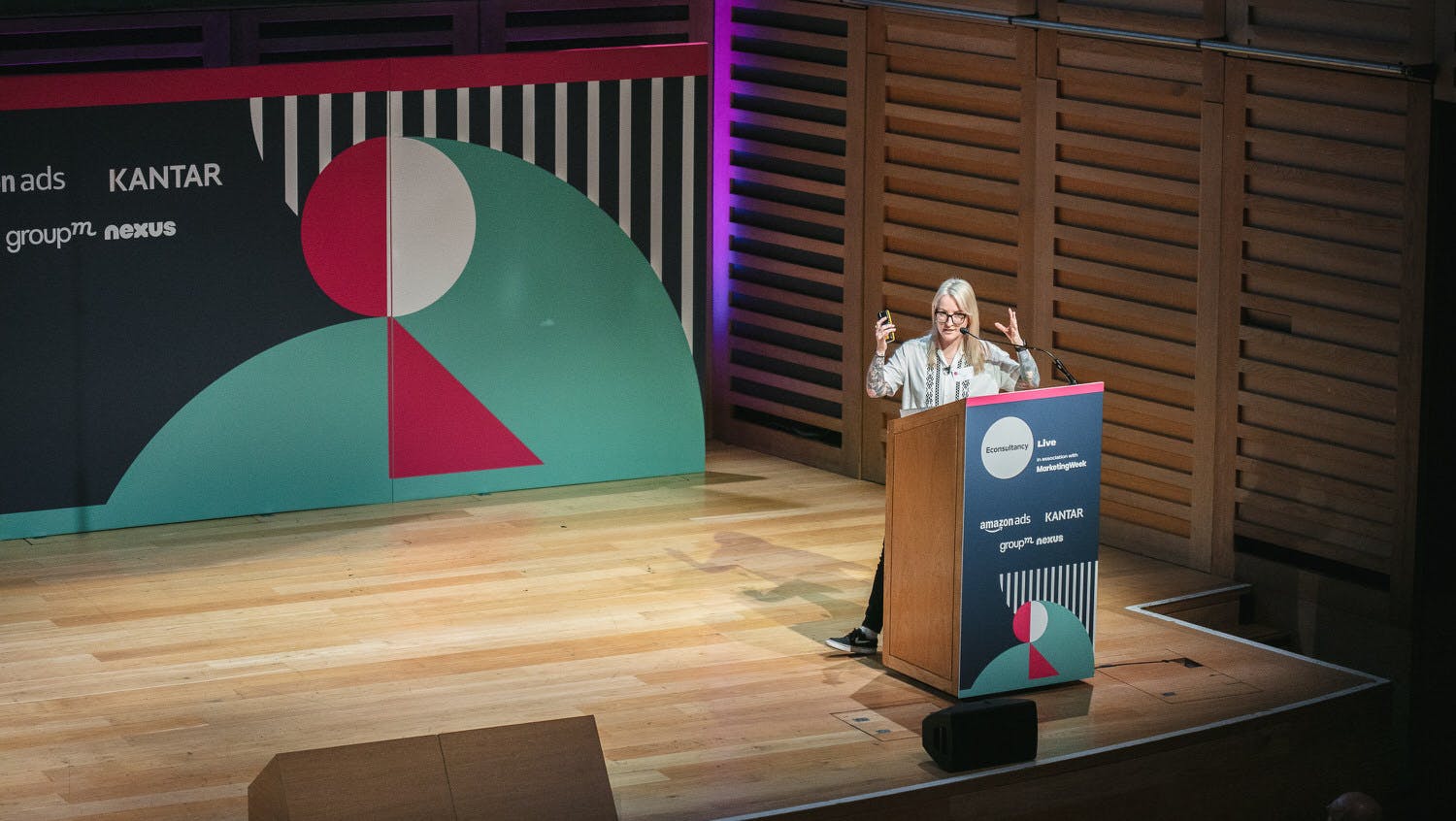“No matter the industry, the OKRs or the targets, what we’re here to do is meet user needs,” says Em Ledger, executive product manager at the BBC, getting to the nub of her profession. “Truly understanding the user is the most pivotal thing and why we’re here.”
Ledger – who works on sign-in, registration, verification and platforms across the BBC – describes product management as creating “a foundation” for growth and collaboration in the business, even when disruption may be “part and parcel” of every day.
“It’s my very strong belief that business goals and user goals should be one and the same,” she said, speaking at Econsultancy Live last week. “Listening to users is a big cheat sheet to success. If you’re not sure about what to put on a roadmap, ask your users, they will absolutely give you everything you need.”
Meeting user needs. Removing unnecessary friction.
Ledger gives an example of the continuous discovery and delivery inherent to product management, sharing how analytics and user feedback helped her team to experiment with the ‘challenge screen’ – the interface where users are prompted to log in to iPlayer for the first time on a TV.
“We found out in an experiment that 70% of people bounce from that screen, which is crazy, [and] was a huge surprise to everybody at the time.”
“We [thought] we could… improve the journey [by adding] a QR code. How wrong we were!”
Listening to users is a big cheat sheet to success.
Ledger revealed, “we discovered not everybody has a secondary device and if we go back to the thought process of [understanding user context], they might be on the settee, they might have the big blanket on. [If] they don’t have a phone in their hand, they might [choose to] watch [another service]”.
Some users also had difficulty inputting a passcode from the TV screen into their secondary device, such as a phone or tablet. “What was actually happening when we watched the screen recording back is that users were inputting the code into the password field and having so many problems and ended up complaining and still not actually being able to get to the content.”
“So, something like this is super important for us at the BBC”, said Ledger. “We’re a public service… We were adding unnecessary friction… It goes without saying… that will fundamentally damage those relationships and that bond with the user.”
“Regardless of… top level targets, if we don’t get this [sign-in experience] right, we are going to impact OKRs and KPIs negatively.”
“Everybody’s needs must be taken into consideration”
Ledger outlined her understanding of product management as a human-led discipline. “We are humans creating great journeys for humans,” she said. “So, if we don’t have that representation of all humans in-house, how are we supposed to meet human needs?”
“We must make sure everybody has a seat at the table,” she added. “Everyone’s needs must be taken into consideration, not as an add-on or something to think about later, but actually built-in and baked-in from the start.”

To illustrate the point, Ledger highlighted the fact that a third of people over the age of 60 in the UK don’t actually have an email address, something required to create a BBC account. “That is a huge problem and it came out of user research,” she says.
“We have to make sure that we are embedding accessibility into everything we do, and it needs to be seen, from product teams [to] senior leadership. We need to have that visibility and have everybody understand how important it is, so we don’t let things fall through the cracks. We have to be held accountable. …So many people, every single day, depend on [our products].”
Setting up a roadmap
To put the principles of product management into place, Ledger recommends setting up a “strategy and roadmap deck for your area”, one that outlines your vision and principles, sets the scene and describes current problems to solve (for the user and the business) and how you are going to do so.
She highlights the frustration that product management teams can feel when their remit or their plan isn’t made clear to stakeholders. Creating a roadmap document is one way of solving this problem, “a starting point to get everybody on the same level,” said Ledger.
“Your workforce is human. Your teams are human.”
A theme Ledger returned to over and again in her talk is the idea that the human-centred approach to product management applies across the board. “Your workforce is human. Your teams are human,” she said.
“People need to see and feel [that they are] a part of the company vision. They need to feel that the products that they create… [are] designed for them, their families, their friends.”
“We need to make sure that all staff members can bring their whole selves to work. They need to be able to challenge, share opinions, collaborate, and learn from each other. We need to give them the space and the time to do great work.”
“We need to take accountability for our unconscious bias. We need to make sure we invite internal employee network groups to review practices. We need to provide those spaces for people to come forward and challenge something if it’s not quite right.”
This extends to recruitment and the need to create a culture of “mentoring young people” and “really nurturing STEM pipelines,” she added.
Ledger revealed she grew up with dyscalculia, didn’t study IT or gain GCSEs in maths or science, and said, “I never saw anybody doing anything like [product management].”
“I didn’t realize I could be here, working in tech, it completely changed my life.”
UX resources from Econsultancy
Econsultancy members can download our guide to User Experience and Interaction Design or our Product Strategy Best Practice Guide.
For training, see our customer journey mapping and customer experience courses.


Comments